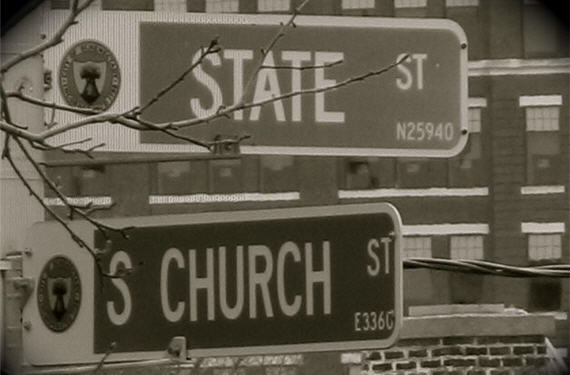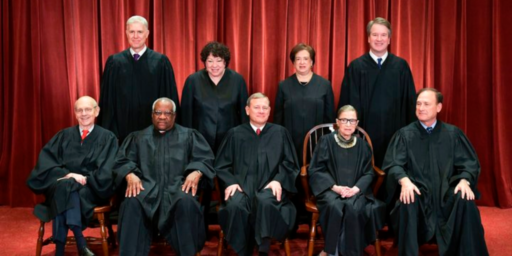Social Conservatives Leading Effort To Block Legalization Of Sunday Alcohol Sales In Georgia
The success of Christian conservatives in blocking efforts to legalize Sunday alcohol sales in Georgia demonstrates why concentrating solely on national politics is a mistake.
This strikes me as perhaps one of the most patently silly stories out there right now:
The latest attempt at Sunday alcohol sales legislation in the state Senate appears to be in trouble.
Opposition, especially from Christian conservatives, could prevent a Senate vote this year on a bill that would give Georgia communities a vote whether to allow Sunday beer, wine and liquor sales at stores.
(…)
In the past, Republican lawmakers have blamed the bill’s defeat on Sonny Perdue, a Christian conservative who vowed to veto any Sunday sales legislation while he was governor. Gov. Nathan Deal, who took office in January, said he would sign the legislation.
Georgians in many parts of the state can already buy alcoholic beverages on Sunday at bars, restaurants and ballparks. Georgia is one of three states with a total ban on Sunday sales at stores.
(…)
The Christian Coalition has made it clear that Sunday sales will be an election-year issue. The Georgia Chamber of Commerce, which supports the bill, will include it in its scorecard rating lawmakers.
Rogers’ comments Monday bolstered the spirits of Jerry Luquire, president of the Georgia Christian Coalition.
“I can only say that the grass roots have been heard from, along with local elected officials who don’t want to have to decide whether to put this issue on their ballot,” Luquire said.
Here’s an idea. If you don’t like the idea of buying beer, wine, or liquor on Sundays, then don’t buy beer, wine, or alcohol on Sundays. There is no rational basis for religious conservatives to force their own ideas of how Sunday’s should be spent on the rest of society.
This is one reason why focusing solely on national politics when it comes to issues about how closely allied libertarians/fiscal conservatives should be with social conservatives is a mistake. The power of social conservatives to implement their agenda at the national level is actually pretty limited. Federal funding for abortion and judicial appointments are about as far as they can go in Congress, and even that isn’t always very far. At the state and local level, though, the ability of social conservatives to use the force of the state to enforce their vision of the “moral” society is far more prevalent. It’s why I don’t necessarily buy the “leave it to the states” argument when it comes it issues like abortion and gay marriage because, depending on the state, that could turn out very badly indeed.





Here’s an idea. If you don’t like the idea of buying beer, wine, or liquor on Sundays, then don’t buy beer, wine, or alcohol on Sundays. There is no rational basis for religious conservatives to force their own ideas of how Sunday’s should be spent on the rest of society.
But we liberals are the nanny-staters, right?
Yep. Dems are worse when it comes to libertarian ideals. Much worse.
Guys when it comes to “Nanny State” legislation, the left is as bad as the right. I’m pretty sure it wasn’t Republicans who banned the Happy Meal in San Francisco
Guys when it comes to “Nanny State” legislation, the left is as bad as the right.
Ok, but I’ve been hearing that the left is the nanny state side, and the right is the freedom side, for…well, forever. Hmmm.
Doug, several years ago in Colo (I live in a well known ski resort), we overturned a similar ‘Blue’ law. At the time, a good friend of mine owned a wine store – great store, great wine, great boutique beers and hard liquor – and opined that he disapproved of the law. Not on religious grounds but economic. If the state allowed liquor stores to sell on Sunday, even though he had a niche business, he would be forced to open his just to compete. The loss of exposure (and sales) far offset the increase cost of staffing. In other words, there are factors, other than your favorite whipping horse – social conservatives – that cause folks to oppose, or support, specific legislation.
Back in the early to mid 90’s I traveled to Alabama on a regular basis. Sunday Alcohol sales were OK (at least in the parts of the state (NE) that I frequented) BUT….
You had to get a paper bag from the cashier, go back to the draped off beer cooler, get your beer and place it in the paper sack, than return to the cashier who would look down into the sack to see what you had and ring up the appropriate amount.
It all seemed rather silly, but nobody who would be offended by the sight of beer on a Sunday ever had to see it. I found it a rather elegant solution.
(I should add that I can not say the same was true for hard alcohol. May have been, I just do not remember as beer was all I ever bought on a Sunday in AL)
bains,
So in your friends case it was a case of economic protectionism. Also not an appropriate function of the state. If a wine story wants to be open on Sunday or not, that’s not something that the state should really have any say in.
“I’m pretty sure it wasn’t Republicans who banned the Happy Meal in San Francisco”
Woah…..
Was the Happy Meal actually banned? Nope. Look it up. They banned giving out toys with unhealthy meals, which is kinda lame….but if this is your worst nanny state nightmare, thou doth protest too much.
For goodness sake Doug, No it was not a case of “protectionism”. Every liquor store operated under the same law – any store selling beverages with an alcohol content over 3.2% could not operate on Sundays. The change allowed those stores – all those stores – to operate on Sundays. And it wasn’t primarily social cons opposing the change.
It seems this is Georgia’s problem, not mine. If they feel the tradition of no Sunday alcohol sales is a worthy tradition to preserve then I don’t see it as that big of deal. Maybe the other rational argument is to increase Monday productivity. How about fewer drunk drivers on Sundays? You know the more I think about it there are probably rational reasons to oppose the change. Now if I lived in Georgia I would prefer Sunday sales but that doesn’t mean those opposed are irrational.
Hey, considering the evil self-described ‘social conservatives’ usually get up to, I think this is about the best use of their time…
Here where I live in Texas, you can not by booze on Sunday before 1:00 pm. Everyone seems fine with that. That gives everyone a chance to attend church before getting drunk.
“Maybe the other rational argument is to increase Monday productivity. How about fewer drunk drivers on Sundays?”
These would be rational arguments if you can show that a ban on Sunday sales increases Monday productivity or decreases drunk driving on Sundays.
Here in Colorado, thanks to our progressive swing lately, we’ve been revisiting our own “blue law” policies. We allowed liquor sales on Sunday….and all the liquor stores cried foul.
They had a state-mandated day off, and we so selfishly took it away.
The big fight now is to allow grocery stores to sell liquor. Again, the liquor stores are crying foul. “I can’t compete with Wal-Mart,” they all say. (“You’re probably right,” I say, “but that’s because your wine selection sucks.”)
Herb, I agree. There are arguments to be made and points to be debated. I was just pointing to some people that there are rational arguments.
It’s kind of funny the Conservatives are maligned for trying to keep the status quo in this case just as some progressives are trying to reduce liquor stores in minority neighborhoods. Both sides have rational arguments since, after all, liquor is commonly considered a vice.
Herb says:
Check out New Hampshire’s blue laws…
> It seems this is Georgia’s problem, not mine. If they feel the tradition of no Sunday alcohol sales is a worthy tradition to preserve then I don’t see it as that big of deal.
RIght. And since the GOP has a history of curtailing personal freedom, there is no real issue hear at all, is there?
“Check out New Hampshire’s blue laws”
Didn’t find much on blue laws in New Hampshire. (Blue laws refer mostly to prohibiting certain business transactions on Sundays for religious reasons.) Are you referring to their state-run liquor stores?
Bains, it was protectionism in that your friend wanted the state to impose a restriction he wanted or enjoyed on all his competitors so he could be protected from free and open competition. Also, his fear of loss of sales was his own concern and apparently his specialized inventory wasn’t drawing in the bulk of his business. Chic-fil-A has a policy of being closed on Sundays and they do quite well. Yet, they don’t appeal to the chicken police to impose their favored rule on their competitors.
The problem with Blue Laws in they suppose that Sunday is the religious day. Why not ban sales from sundown Friday to sundown Saturday for the Seventh Day Adventists? Why must the day of relief from alcohol be Sunday? Could it be Tuesday?
Greetings:
I grew up in the Bronx of the ’50s and the ’60s. The local blue laws prohibited, among other things, bars from opening until 1pm on Sundays. In our (Catholic) parish, that was referred to as the 1 o’clock Mass.
Back then, most stores didn’t/couldn’t open for business on Sundays. When those laws were overturned, I never quite understood the economics of stores wanting to open an additional day of the week with those incumbent expenses. It wasn’t like their market suddenly had an additional 10% to spend. But once the early adopters bought into it, the rest of the lemmings could resist a good cliff.
In our family, Sundays, after church, were primarily family time. Visiting or being visited by relatives obviously doesn’t supply the emotional rewards of rampant consumerism (and its resultant debt) but it can have some minimal benefit with adequate commitment. My memory tells me that most of the argument against the blue laws was that they were “religiously” based. I always kind of hoped that government might declare Sundays “Family Day” to justify its imposition of reduced commercial activity. You know, for the kids.
It was not protectionism. My friend opened under one set of regulations, and had to alter his business model after that regulation changed. And he operated successfully until Obama took a lousy economy and cratered it. The point I am making is that there are legitimate reasons, other that Doug’s whipping horse, for opposing the change.
@Bains
“And he operated successfully until Obama took a lousy economy and cratered it.”
Heh, yeah, right. Took on a cratered economy is more like it. And, anyway, exactly what does the federal government have to do with a bunch of sanctimonious bible thumpers passing laws in a backwater state to prevent the citizens of that state from shopping where they wish on Sunday?
(Love the irony there.) It doesn’t and I did not even imply that it did.
I object to the implication that I am sanctimonious. I will cop to being bigoted toward bible thumpers and backwater states. I try hard not to be, but I fail.